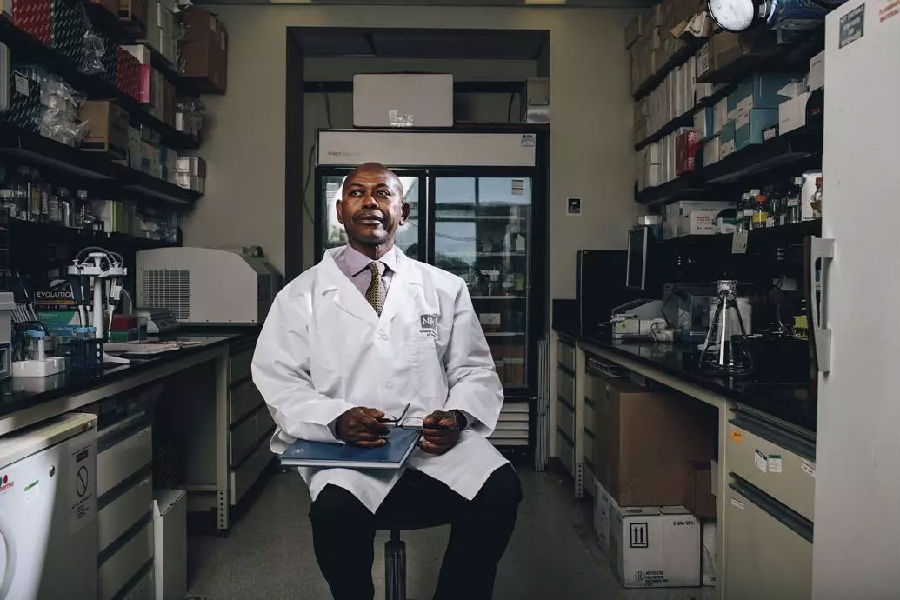(单词翻译:单击)
中英文本
Cover Story
封面文章
Cancer Scientists Have Ignored African DNA in the Search for Cures
癌症科学家在寻找治疗方法时忽略了非洲的DNA
BY JESSICA WAPNER
作者:杰西卡·韦普纳
Charles Rotimi first realized the future was passing him by around 2005.
查尔斯·罗蒂米在2005年左右第一次意识到未来正在离他而去。
The Human Genome Project had recently finished spelling out an entire set of human DNA.
人类基因组计划最近完成了一套完整的人类DNA的复写。
Following that breakthrough, scientists in six countries across the globe had begun collecting blood samples to find genes responsible for various conditions, including serious diseases, which could lead to treatments.
在这一突破之后,全球6个国家的科学家开始收集血液样本,以寻找治疗各种疾病的基因,包括用于治疗严重疾病的基因。
And Rotimi, who was leading that collection effort in Africa, had the sick feeling that history was repeating itself.
而在非洲领导负责这项工作的罗蒂米,深忧于历史正在重演。
He wasn't concerned about himself so much as his homeland.
与其说他关心他自己,不如说他关心他的祖国。
In the past, African patients have had poor access to medical advances, even as scientists use them as research subjects.
过去,即使科学家将非洲患者作为研究对象,他们也很难获得医疗进步。
Rotimi worried that genetics might again exploit the 1 billion people sub-Saharan Africa, ignoring their need for treatments for HIV, tuberculosis, malaria and cancer.
罗蒂米担心遗传学可能再次利用撒哈拉以南非洲的10亿人口,而忽略了他们对艾滋病、结核病、疟疾和癌症治疗的需求。
"The genomic revolution was going to fly over Africa," he says, "and tomorrow’s medicine will not work for all."
“基因组上空展开,”他说,“未来的药不会对所有人都有效。”
His concern was well founded.
他的担忧并不是空穴来风。
Over the next few years, scientists came out with a frenzy of discoveries about our DNA that could possibly lead to new treatments for diabetes, cancer, psychiatric illnesses and other serious diseases.
在接下来的几年里,科学家们对我们的DNA进行了大量的研究,这些发现可能会为糖尿病、癌症、精神疾病和其他严重疾病的治疗提供新的方法。
But they were drawing from a small slice of the world: Nearly all of the published work was based on populations with European ancestry.
但他们的研究来自世界的一小部分:几乎所有出版的作品都是基于欧洲血统的人群。
By 2009, fewer than 1 percent of the several hundred genome investigations included Africans.
截止到2009年,在几百个基因组调查中,只有不到1%的调查包括非洲人。
The genomics revolution soon began to sputter.
基因组革命很快就开始了。

Being able to know the exact genetic makeup of each patient was to bring a new era of treatments tailored for each individual.
了解每位患者确切的基因组成,将会带来一个新时代:为每位患者量身订造治疗方案。
But doing so depends on finding minute variations in our DNA that correlate with the occurrence of disease or bad drug reactions.
但是否能做到这一点,取决于我们DNA中与疾病或不良药物反应相关的细微变化。
This task requires the full range of genetic variation among as many humans as possible.
这项任务需要尽可能多的人类中的完整基因变异。
Otherwise, genomics research is like a search party that circles the same few trees looking for signs of the killer rather than spreading out through the entire woods.
否则,基因组学研究就像一个搜索小组,在相同的几棵树周围搜寻凶手的踪迹,而不是在整个树林中展开。
The richness of African genomes is a product of the evolution of our species.
非洲基因组的丰富是我们物种进化的结果。
Modern Homo sapiens originated in Africa about 200,000 years ago.
约20万年前,现代智人起源于非洲。
About 100,000 years later, 1,600 or so men and women—from a population of at least 20,000 and likely much more—left the continent and spread around the globe, eventually reaching Europe and, more recently, the Americas.
约10万年前,从至少有2万或是更多的人口,只剩下共约1600名男性和女性,离开欧洲大陆,传播到世界各地,最终到达欧洲,再后来到达美洲。
"In other words," wrote University of Washington geneticist Mary-Claire King and colleagues in a 2017 commentary, "about 99 percent of our evolutionary experience as a species was spent in Africa."
“换句话说,”华盛顿大学遗传学家玛丽-克莱尔·金及其同事在2017年发表的一篇评论文章中写道,“我们99%的进化经验都是在非洲物种进化的结果。”
Whatever genetic diversity existed across the continent until then was almost entirely left behind when that small group emigrated—and it is there still, hidden in the genes of each African.
在此之前,无论整个非洲大陆存在何种遗传多样性,当这个小群体移民时,几乎都被完全抛在了身后——但这种物种多样性仍然存在,隐藏在每个非洲人的基因中。
That is partly why Rotimi was so dismayed by the exclusion of Africa from genomics.
这就是为什么罗蒂米对非洲被排除在基因组学之外感到如此沮丧的部分原因。
"We are all Africans beneath our skin," he says.
“在皮肤下,我们都是非洲人,”他说。
More and more scientists are coming around to Rotimi's view—
越来越多的科学家开始接受罗蒂米的观点——
that Africa contains one of the greatest weapons in the quest to combat cancer: the DNA of its people.
在与癌症作斗争的过程中,非洲拥有最伟大的武器之一:人类的DNA。
译文由可可原创,仅供学习交流使用,未经许可请勿转载。
重点讲解
1.spell out 清楚地解释,详细说明
Be assertive and spell out exactly how you feel.
自信点,把你的真实感受详细说出来。
2.exploit you 利用,剥削
Critics claim he exploited black musicians for personal gain.
批评家们声称他为私利利用了黑人音乐家们。
3.slice of (情况或活动的)部分
Fiction takes up a large slice of the publishing market.
小说占出版市场的一大部分。
4.come around to 转而接受
It looks like they're coming around to our way of thinking.
好像他们正在转而接受我们的思维方式。


